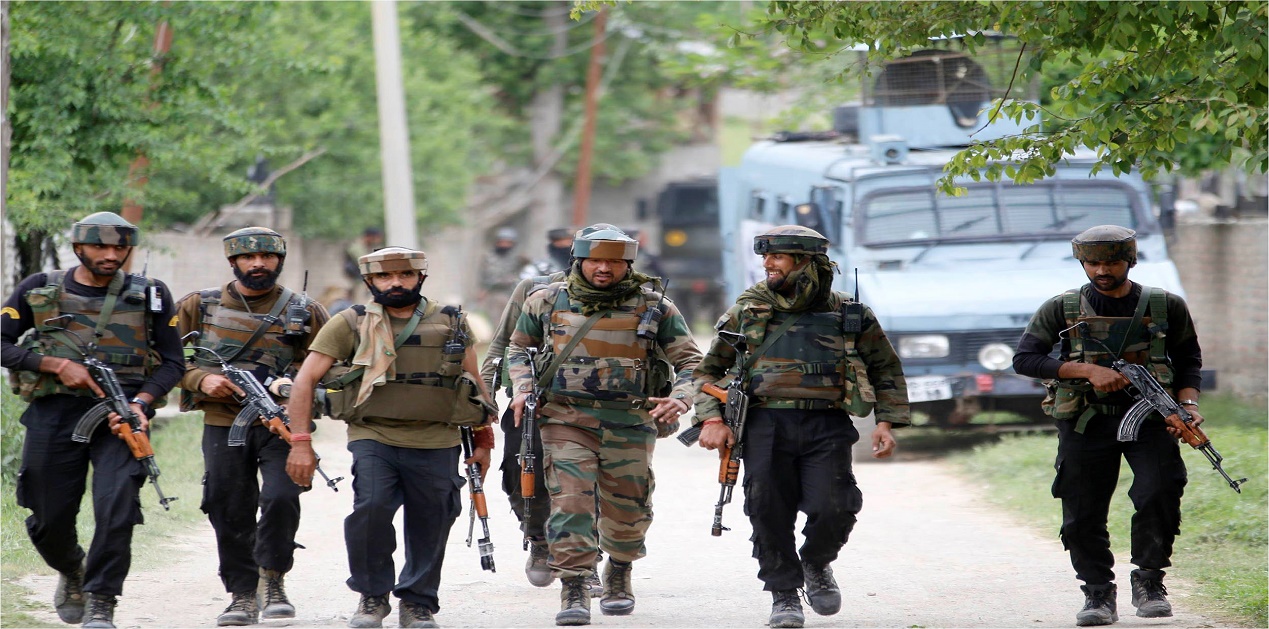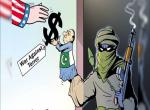The pandemic of COVID-19 may have halted or transformed the way of carrying out activities around the world, but nothing has changed in India’s counter-terrorism operations in the Kashmir Valley. These remain very robust and strongly driven by accurate, actionable intelligence. It was so even on 04 May 2020 when a joint team of the Indian Army, the Central Reserve Police Force (CRPF), and the Jammu and Kashmir (J&K) police, acting on reliable intelligence inputs, mounted a Cordon and Search Operation (CASO) to capture the most wanted terrorist and Hizb ul-Mujahideen (HM)’s chief operational commander in the Kashmir Valley— Riyaz Naikoo, at his native village— Beighpora in Awantipora in Pulwama district of the J&K.1 On the second day of the operation, there was fierce gun-battle between the terrorists and security forces in which Riyaz Naikoo and his two associates were killed.2This was confirmed to the media by Inspector General of Police, Kashmir who said that Naikoo was killed along with his aide in an encounter in Awantipora.3
The killing of HM’s Riyaz Naikoo is the most significant success for the security forces over the last nearly one year since the elimination of former chief of Ansar Ghazwat ul-Hind (AGuH)— Zakir Musa, on 23 May 2019. This article attempts to trace Riyaz Naikoo’s journey from a mathematics subject teacher in Kashmir to becoming the chief operational commander of one the most important and active Pak-supported terrorist groups— Hizb ul-Mujahideen (HM).
The Operation
Riyaz Ahmad Naikoo was one of the most wanted terrorists and enlisted as “A++” category terrorist on ‘most wanted list’ of security forces. Over at least the last six months, the Special Operations Group (SOG) of J&K police had been monitoring the movements of Riyaz Naikoo. Before the launch of this operation, they received reliable information that Riyaz Naikoowould be visiting his family and relatives in his native village of Beighpora. On several occasions earlier, Naikoo was cornered by the security forces, but he had always managed to escape. However, this time around, operation code-named “Jackboot” to hunt-down the high-value targetwas meticulously planned and on 04 May 2020, the joint contingent of the security forces comprising personnel belonging to J&K Police, the CRPF and 21 Rashtriya Rifle (RR) cordoned and searched the village area. By late evening of 05 May 2020, the forces surrounded the village.4 During the early hours of 06 May 2020, an exchange of fire took place between security forces and Riyaz Naikoo and his associates. Naikoo was trapped with no way to dodge the security forces as he had managed to do on the earlier occasions. After hours-long gun-battle, Naikoo and his associates were shot down, and their bodies were located in a bunker hideout from where they had been shooting at the forces.
Having learnt the right lessons from events post killing of Burhan Wani that saw regular and extended civil confrontation through well-organised stone-pelting events, the J&K administration has been following a policy of denying glorification of killed terrorists by the locals organising big funeral gatherings. Accordingly, the dead bodies of Riyaz Naikoo and his associates killed in operation were not handed over to the family or relatives; but buried by authorities at an undisclosed location.5 In a further precautionary move, after the killing of Naikoo, the authorities shut down mobile telephone and internet services in the Valley. To maintain law & order, curfew-like restrictions were imposed in parts of Kashmir, including Srinagar city. There were only some intermittent incidents of stone-pelting took place in Awantipora area where the operation took place.6
Operation ‘Jack-Boot’
The operation Jack-Boot was initially conceived at the time when terrorist groups in South Kashmir had claimed that districts of Pulwama, Kulgam, Anantnag and Shopian were “Liberated areas”. It was at its peak when the Burhan Wani’s gang lured local educated youth into joining HM terror group; local police personnel were tortured, harassed and even killed in targeted action for joining the counter-terrorism operations in the Valley.7 Through well planned and strategic decisions under ‘Jack-Boot’, the security forces had managed to eliminate members of the Burhan Wani’s gang— Wasim Malla (April 2015), Afaqullah Bhat & Adil Ahmed Khanday (October 2015), Naseer Ahmed Pandit (April 2016), Sabzar Ahmed Bhat (May 2017), Saddam Paddar& Mohammad Rafi Bhat (May 2018), Wasim Shah aka Abu Osama Bhai (October 2017) and Anees8. Besides, Tariq Pandit was arrested at near Karimabad area in Pulwama district in May 2016.
It may be recalled that in May 2017, under high level authorisation, a list of 12 most-wanted terrorists was made public. From that list, Riyaz Naikoo was the only surviving terrorists evading elimination till the day of his killing. Through “Jack-Boot” operation, the security forces have broken the backbone of the HM leadership in the Valley by eliminating all the listed high-value targets of terrorist groups operating in the Valley, particularly of the Hizb ul-Mujahideen.
After a short period of inactivity, operation Jackboot was re-initiated the post-Pulwama attack by JeM activist in February 2019. During 2019, under the first phase of Jack-Boot, around 104 terrorists were killed, including top commanders of Jaish-e-Mohammad (JeM), and dozens of terrorists belonging to the Lashkar-e-Taiba (LeT), and Hizb ul-Mujahideen.9
Naikoo’s Journey from a Teacher to Operational Commander
Riyaz Naikoo was born in 1985 in a family of a farmer in Beighpora village of Awantipora area in Pulwama district of J&K. He was a quiet young boy, very regular at praying and reading the Holy Quran. He was reportedly good in studies, scoring over 77 per cent in class XII examinations. Naikoo graduated in Mathematics from Government College in Pulwama and started teaching mathematics in a private school.10 As a passion, he offered free-of-cost tuition to needy students in the area.
In 2010, Riyaz Naikoo was arrested for his participation in a protest against a death of a 17 years-old boy— Tufail Ahmed Mattoo in 2010 clashes/stone-pelting between people and security forces.11 Many violent protestors were arrested that day. Riyaz Naikoo was one of them. It is believed that this was the turning point in his life. After his release from prison in 2012, Riyaz joined Hizb ul-Mujahideen and became a famous face among the group.
In 2016, Naikoo made a dramatic public appearance at the funeral of another terrorist—Shariq Ahmad Bhat in Shopian district, along with other terrorists carrying AK-47 rifles. Naikoo initiated the ritual of giving “gun-salute” to the slain terrorists at their funeral.12
In 2018, in an interview given to Al-Jazeera,13 Riyaz Naikoo told the interviewer that while working as a teacher in a private school and doing part-time social work in Pulwama district, he had met another terrorist— Parvaiz Musharraf who guided him and motivated him to join the “armed struggle”. Finally, on 01 June 2012, under the code-name Zubair, he joined Hizb ul-Mujahideen.
On 28 August 2018, J&K police detained Riyaz Naikoo’s father—Assadullah Naikoo, for questioning about the whereabouts of his son. In vengeance to arrest of Naikoo’s father, HM terrorists killed four police officers on the same day and abducted 11 relatives of policemen from Shopian, Kulgam, Anantnag, and Awantipora.14 Later on 31 August, after two days, police released the father of Naikoo and subsequently, the terrorists released 11 relatives who were abducted in vengeance.
Riyaz Naikoo’soperational strategy was always weaved around targeting the security forces personnel, mainly the State police officials and their families in south Kashmir, and persistently recruiting local youth for the expansion of the group.15 A lesser-known fact about Riyaz Naikoois that he was highly tech-savvy. He never left behind any digital footprints and always let other terrorists to take centre-stage by staying away from the glare. He rarely used a regular phone and preferred using the Virtual Private Network (VPN) for communication. He also extensively used a secure messaging application— Bat Messenger, under the pseudonym “Williamson”, a name also used on other communication platforms.16 Riyaz Naikoo’s last audio message appeared on the social media platform in April 2020 in which he advised locals to follow the guidelines issued by the medical experts on containing the spread of COVID-19 in the Kashmir Valley.17
Naikoo was the longest surviving high-value terrorist in the Valley; somehow, managing to escapeencounters with the security forces, for a record eight years. Whenever cornered, he managed to escape, but on 06 May he was not so lucky.
The rise of Riyaz Ahmad Naikoo aka Zubair ul-Islam aka Mohammad bin Qasim,(35 years) in the HM hierarchy started slowly after the killing of Burhan Muzzafar Waniin July 2016in Anantnag district in J&K.18 Later, in August 2017, in another successful counter-terrorism operation, Burhan’s successor as HM commander Yasin Itoo/Yatooaka Mehmood Ghaznavi was eliminated at Awneera village in Shopian district. 19 Zakir Musa moved up the ladder as a successor of Yasin Itoo. However,soon, on ideological grounds, Zakir Musa defected from HM and formed another terrorist group— Ansar Ghazwat ul-Hind (AGuH), an al-Qaeda affiliate/ group in India. This was the real turning point in the life of Riyaz. Within five years of his joining Hizb, he rose to the rank of its chief operational commander in the Valley.
Following the abrogation of Article 370 in J&K on 05 August 2019, there were series of attacks on the security forces andcivilian targets, including migrant labourers, and fruit traders in various parts of South Kashmir. These were believed to have been masterminded by Riyaz Naikoo.20
Hizb ul-Mujahideen Post-Naikoo
As is well known to Kashmir watchers, right from the early 1990s when cross border terror was unleashed in Kashmir, the Hizb cadres, nearly exclusively comprising local Kashmiri boys, formed the backbone of militancy. Even the operations of the highly radicalised Jihadi groups like Harkats, Lashkars and the Jaish, heavily depended on HM for local support. HM also suffered the heaviest attrition over the last nearly three decades of militancy/terrorism in the State. Lately, HM is mostly active in its stronghold in South Kashmir districts of Kulgam, Shopian, Anantnag and Pulwama. The success of its operations largely depends on HM’s local recruited and sympathisers.
Earlier this year, IGP Kashmir had said, “If we are able to kill Riyaz Naikoo, Hizb would almost be wiped out from South Kashmir”.21 Naikoo’s killing is undoubtedly a considerable setback for HM which has though quickly moved in to appoint Gazi Haider aka (Dr) Saifullah as a new chief operational commander to carry out terrorist activities in the Valley.22 On the same day of the killing of Naikoo, the joint team of J&K police and Army had arrested another Hizb ul-Mujahideen terrorist— Tanveer Ahmad from Tantana village in Doda district and an Over Ground Worker (OGW)— RaqibAlam, who was arrested on 07 May 2020 from Sawdana area of Doda district.23

According to the data in the graph above, the situation of Hizb ul-Mujahideen (HM) in Kashmir valley can be analysed in two parts, (i) from 2016 to 2018, and (ii) 2018 onwards. In 2016, the elimination of Burhan Wani had a considerable impact on the local HM sympathisers that might have led to the rise in recruitment in HM. The years 2017 and 2018 had an increase in the counts of the killing of HM terrorists from 24 (in 2016) to 34 (in 2017), and 44 (in 2018 but a decline in the arrests (from 53 in 2017 to 43 in 2018) which highlights the elimination of HM terrorists in counter-terrorism operations in the Valley. Post-2018 onward, the graph of killings and arrests was on the decline. In 2019, almost similar numbers of killings and arrests of HM terrorists took place (32 killings and 37 arrests), and as of the data available till 06 May 2020, the arrests were slightly more than the killings (21 arrests against 19 killings).
Through effective cooperation among the security forces, Indian Army’s RR, J&K Police’s SOG (Special Operations Group), and the CRPF deployed in J&K, and the credible and timely intelligence inputs provided by the intelligence community, there is no doubt that HM leadership in the Valley, particularly its key commanders have been finding it difficult to survive for long. In coming months Naikoo’s successor, Gazi Haidar aka Saifullah Mir aka Dr Saif24 too will face intense pressure from the intelligence/security set up to survive for long. Media reports also added that Saifullah was radicalised by Naikoo about six years ago and is a ‘Cat-A’ terrorist mostly active in the South Kashmir districts of Pulwama, Kulgam and Shopian.
As its characteristic reaction, once again Pakistan expressed its frustration over the killing of Riyaz Naikoo diplomatically and accused India of carrying-out illegal operations and torturing people of Kashmir. On 06May 2020, Pakistan Prime Minister Imran Khan made accusations, through his Twitter handle (@ImranKhanPTI), targeting Indian government’s ruling party— Bhartiya Janta Party (BJP) for its counter-terrorism policies executed in Kashmir and the disturbance it may cause in the South Asian region. PM Khan tweeted that “……the brutal policies of the BJP are fraught with serious danger. Let the international community give up before any foolish move by India destroys the peace and security of South Asia.”25 In another ‘venomous’ reaction to the killing of Naikoo, on 07 May 2020, Pakistan’s Ministry of Foreign Affairs issued a press release in which they labelled their State-sponsored terrorism as a “resistance” movement and glorified terrorist Riyaz Naikoo as a “local Kashmiri resistance fighter”.26 HM Supremo and head of terror alliance— United Jihad Council (UJC)— Syed Salahuddin who attended a gathering to condole the killing of Riyaz Naikoo, warned India that Naikoo’s sacrifice would help HM in “achieving the mission which they had set to achieve.”27
Another newly formed terrorist group— The Resistance Front (TRF) has recently emerged and has been able to capture the attention of security agencies. The TRF is a proxy group for the infamous designated international terror organisation Pakistan-based Lashkar-e-Taiba (LeT), projecting itself as a ‘shadowy’ local terror outfit. After its formation, TRF ‘claimed’ its first attack on 05 April 2020 alongside the Line of Control (LoC) in the Kupwara sector in which five Army personnel attained Veergati(fell in the battle). The J&K Director-General of Police (DGP) Dilbag Singh has said that TRF was a front of the LeT and has been pushed by Pakistan’s Inter-Services Intelligence (ISI) in Karachi.28
Meanwhile, it is strongly speculated that HM suspects TRF of having played a role in the killing of Riyaz Naikoo. A phone intercept of one of the terrorists trapped along with Naikoo hinted at such a possibility; it is alleged. In the intercept, the terrorist was heard saying to a person (addressed as Wahid Bhai) that-29 “We are stuck in Beighpora, Pulwama... I am injured but Riyaz Bhai [Riyaz Naikoo] is fighting. This the doing of our own people. This new tanzeem, they are the ones behind this. Stay away from them, they will ruin our Kashmir.”
Having had all its high-value commanders eliminated at regular intervals in the recent years, HM would find it progressively tougher to sustain its existence, especially when a new group like TRF is set up in the progressively shrinking operational space and all set to replace HM’s operations in the Valley. The killing of Riyaz Naikoo has been a massive setback for the HM and its Pak sponsors. There will be no relent for the security establishment in the Valley since the terror factory in Pakistan is not likely to stop its conveyor-belt production of terrorists. It would not be advisable to expect any relief from everyone’s preoccupation with the fight against the pandemic of COVID-19 on either side of the border. Even the reported establishment of a new terror outfit — The Resistance Front (TRF), may need a careful watch and reconfirmation since HM as a brand name retains its validity to project the trans-border terror as ‘indigenous’. It could well be just one more attempt on the part of ISI to ‘create’ a new outfit to counter the impact of any possible adverse ruling at the ongoing investigation by the Financial Action Task Force (FATF).
Endnotes
- Snehesh Alex Philip. “Kashmir’s most wanted terrorist Riyaz Naikoo killed in encounter in his Pulwama village”, The Print, 06 May 2020, Available from: https://theprint.in/defence/kashmirs-most-wanted-terrorist-riyaz-naikoo-killed-in-encounter-in-his-pulwama-village/415391/
- Shishir Gupta. “Riyaz Naikoo, top Hizbul Mujahideen terrorist, killed in Pulwama encounter”, Hindustan Times, 06 May 2020, Available from: https://www.hindustantimes.com/india-news/riyaz-naikoo-top-hizbul-mujahideen-terrorist-killed-in-pulwama-encounter/story-aPZOgGE1lfaaYDwXHoy7RK.html
- Bashaarat Masood, Naveed Iqbal, and Adil Akhzer. “Valley’s most wanted militant Riyaz Naikoo killed in Awantipora encounter”, The Indian Express, 07 May 2020, Available from: https://indianexpress.com/article/india/jammu-kashmir-militant-riyaz-naikoo-killed-awantipora-encounter-6397625/
- Shishir Gupta. “Top Hizbul terrorist Riyaz Naikoo was hiding in south Kashmir bunker; killed in overnight op”, Hindustan Times, 06 May 2020, Available from: https://www.hindustantimes.com/india-news/riaz-naikoo-aka-bin-qasim-kashmir-s-hizbul-chief-shot-dead-in-overnight-op/story-aLbwShbIpilgSr3gCdjbHO.html
- DNA Web Team. “Bodies of Riyaz Naikoo, associate to be buried at undisclosed location”, 06 May 2020, Available from: https://www.dnaindia.com/india/report-bodies-of-riyaz-naikoo-associate-to-be-buried-at-undisclosed-location-2823863
- PTI. “Riyaz Naikoo encounter: Sporadic incidents of stonepelting in Pulwama”, The Economic Times, 07 May 2020, Available from: https://economictimes.indiatimes.com/news/defence/riyaz-naikoo-encounter-sporadic-incidents-of-stonepelting-in-pulwama/articleshow/75600597.cms
- “About operation ‘jackboot’ which claimed its last high value target in killing of Riyaz Naikoo”, The New Indian Express, 06 May 2020, Available from: https://www.newindianexpress.com/nation/2020/may/06/about-operation-jackboot-which-claimed-its-last-high-value-target-in-killing-of-riyaz-naikoo-2139963.html
- Ibid.
- “ऑपरेशनजैकबूट 2 मेंमारागयाआतंकीसरगनारियाजनाइकू, एनएसएअजितडोभालनेकीथीव्यूहरचना”, Jagran, 08 May 2020, Available from: https://www.jagran.com/news/national-terrorist-leader-riyaz-naiku-killed-in-operation-jackboot-2-nsa-ajit-doval-did-prancing-20252286.html
- Bharti Jain and M Saleem Pandit. “Riyaz Naikoo: Maths teacher who became a dreaded terror overlord”, The Times of India, 07 May 2020, Available from: https://timesofindia.indiatimes.com/india/maths-teacher-who-became-a-dreaded-terror-overlord/articleshow/75589164.cms
- AzaanJavaid. “Riyaz Naikoo— dreaded militant who ‘looted farmers and brought new ruthlessness to Hizbul’”, The Print, 06 May 2020, Available from: https://theprint.in/india/riyaz-naikoo-a-maths-graduate-who-looted-farmers-and-brought-new-ruthlessness-to-hizbul/415831/
- Yusuf Jameel. “From math teacher to militant: Riyaz Naikoo said Art 370 abrogation was irrelevant”, Deccan Chronicle, 07 May 2020, Available from: https://www.deccanchronicle.com/nation/current-affairs/070520/from-math-teacher-to-militant-riyaz-naikoo-said-art-370-abrogation-wa.html
- “Q&A: Hizbul Mujahideen leader: ‘We will never surrender”, Al-Jazeera, 22 November 2018, Available from: https://www.aljazeera.com/amp/news/2018/11/qa-hizbul-mujahideen-leader-surrender-181109111719903.html?__twitter_impression=true
- FP Staff. “Police releases father of Hizbul Mujahideen commander Riyaz Naikoo after detaining him for 2 days”, First Post, 31 August 2018, Available from: https://www.firstpost.com/india/police-releases-father-of-hizbul-mujahideen-commander-riyaz-naikoo-after-detaining-him-for-2-days-5088671.html
- Bharti Jain and M Saleem Pandit. “Riyaz Naikoo: Maths teacher who became a dreaded terror overlord”, The Times of India, 07 May 2020, Available from: https://timesofindia.indiatimes.com/india/maths-teacher-who-became-a-dreaded-terror-overlord/articleshow/75589164.cms
- Bashaarat Masood, Naveed Iqbal, and Adil Akhzer. “Valley’s most wanted militant Riyaz Naikoo killed in Awantipora encounter”, The Indian Express, 07 May 2020, Available from: https://indianexpress.com/article/india/jammu-kashmir-militant-riyaz-naikoo-killed-awantipora-encounter-6397625/
- SafwatZargar. “Hizbul Mujahideen’s Riyaz Naikoo, one of Kashmir’s longest surviving militants, killed in Pulwama”, Scroll, 06 May 2020, Available from: https://scroll.in/latest/961207/hizbul-mujahideens-riyaz-naikoo-one-of-the-longest-surviving-militants-killed-in-pulwama
- PTI. “Hizbul Mujahideen terrorist Burhan Wani killed in J&K encounter”, The Times of India, 09 July 2016, Available from: https://timesofindia.indiatimes.com/india/Hizbul-Mujahideen-terrorist-Burhan-Wani-killed-in-JK-encounter/articleshow/53121685.cms?from=mdr
- Bashaarat Masood and Muzamil Jaleel. “Big blow to Hizbul Mujahideen, top commander Yasin Yatoo killed”, The Indian Express, 14 August 2017, Available from: https://indianexpress.com/article/india/yasin-yatoo-shopian-encounter-army-guns-down-hizbul-mujahideen-commander-terrorists/
- Bashaarat Masood. “Who was Riyaz Ahmad Naikoo, the Hizbul Mujahideen commander?”, The Indian Express, 06 May 2020, Available from: https://indianexpress.com/article/explained/who-was-riyaz-ahmad-naikoo-hizbul-mujahideen-6396915/
- FayazWani. “Forces hunt for Hizbul Mujahideen chief Riyaz Naikoo to wipe out terror outfit in Valley”, The New Indian Express, 28 January 2020, Available from: https://www.newindianexpress.com/nation/2020/jan/28/forces-hunt-for-hizbul-mujahideen-chief-riyaz-naikoo-to-wipe-out-terror-outfit-in-valley-2095322.html
- Syed Khalid Hussain Hussain and Ankita Bhandari. “More terror attacks on Indian forces: Hizbul Mujahideen’s instructions to new chief Gazi Haider”, Zee News, 11 May 2020, Available from: https://zeenews.india.com/india/hizbul-mujahideen-instructs-new-chief-gazi-haider-to-increase-terror-activities-in-valley-target-indian-forces-2282776.html
- PTI. “Hizbul Mujahideen overground worker held in Jammu and Kashmir’s Doda”, The Times of India, 07 May 2020, Available from: https://timesofindia.indiatimes.com/india/hizbul-mujahideen-overground-worker-held-in-jammu-and-kashmirs-doda/articleshow/75603495.cms
- Shishir Gupta. “Security forces on red alert over terror bombing threat in Kashmir”, Hindustan Times, 11 May 2020, Available from: https://www.hindustantimes.com/india-news/security-forces-on-red-alert-ahead-of-terror-bombing-threat-in-kashmir/story-duMlV2f8SX3oBURPD353PN.html
- Khan, Imran (@ImranKhanPTI). 2020. “…The brutal policies of the RSS and the BJP…”. Twitter. 06 May 2020, 03:50 PM, Available from: https://twitter.com/ImranKhanPTI/status/1257978524906008576
- Government of Pakistan. “Press Release No. 201/2020”, Ministry of Foreign Affairs— Government of Pakistan, 07 May 2020, Available from: http://mofa.gov.pk/press-release-293/
- Shishir Gupta. “Riyaz Naikoo setback upsets Syed Salahuddin, says the spark will spread in region”, Hindustan Times, 08 May 2020, Available from: https://www.hindustantimes.com/india-news/riyaz-naikoo-setback-upsets-syed-salahuddin-says-the-spark-will-spread-in-region/story-TfBIKLGprQk6uTmYhwOldM.html
- Vijaita Singh. “TRF is a ploy by Pakistan to evade scrutiny, says J&K DGP”, The Hindu, 05 May 2020, Available from: https://www.thehindu.com/news/national/trf-is-a-ploy-by-pakistan-to-evade-scrutiny-says-jks-dgp/article31512659.ece
- Abhishek Bhalla. “Betrayed by own, Riyaz Bhai is still fighting: Conversation of terrorists during Kashmir encounter”, India Today, 07 May 2020, Available from: https://www.indiatoday.in/india/story/conversation-of-terrorist-during-riyaz-naikoo-encounter-intercepted-1675252-2020-05-07 ; same report was also covered at: https://www.msn.com/en-in/news/other/betrayed-by-own-riyaz-bhai-is-still-fighting-conversation-of-terrorists-during-kashmir-encounter/ar-BB13ICB1
(The paper is the author’s individual scholastic articulation. The author certifies that the article/paper is original in content, unpublished and it has not been submitted for publication/web upload elsewhere, and that the facts and figures quoted are duly referenced, as needed, and are believed to be correct). (The paper does not necessarily represent the organisational stance... More >>
Image Source: https://www.newsclick.in/sites/default/files/2020-05/Riyaz%20Naikoo_2.jpg











Post new comment